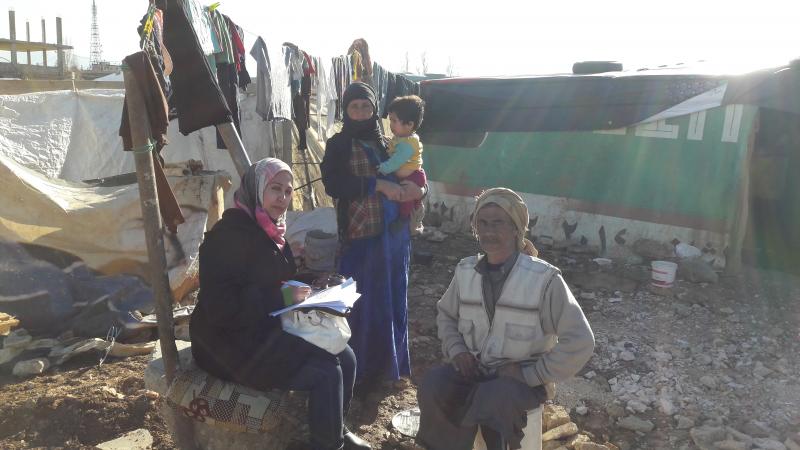A scientist calls attention to the plight of Syrian women

Saja Taha Al-Zoubi is raising awareness about the challenges confronting female agricultural workers displaced by Syria’s ongoing conflict.
In the spring of 2015 Saja Taha Al Zoubi was sleeping on an Aleppo-bound bus when she was awoken by gunfire. The bus was being attacked by armed groups, but fortunately none of the passengers were hurt. Despite the attack and a 12-hour bus ride on secondary roads in the freezing cold, Saja arrived at Aleppo University a day later to defend her PhD degree with honor.
Today, Saja is a research fellow in socio-economic studies at ICARDA and the World Academy of Sciences (TWAS). Her research focuses on rural livelihoods and gender, and since the outbreak of war in Syria she has been investigating strategies to empower women and improve the livelihoods of Syrians displaced by the country’s on-going conflict.
The research has received national and international recognition. She was presented with the L’Oréal-UNESCO for women in science award and her study - “The Role of Woman in Home Economics in Deraa province ” - was commended by the Arab Women Organization, a non-governmental organization working within the framework of the Arab League.
Recognizing women’s central role in agriculture
In 2000, when Saja enrolled in her studies at Damascus University, she began to understand the central role that Syrian women played in the country’s agricultural sector, with many responsible for planting, seeding, thinning, weeding, harvesting, and feeding animals. “Women usually work without wages, helping their families, relatives, and neighbors. It was perceived as being just housework. Not a big deal,” she states. “Women’s engagement in agricultural activities was not considered to be valuable work.”
Things have changed since Saja began her studies. Today, women do receive wages for their work in agriculture. However, a significant gender gap remains. Research undertaken by Saja in November 2016 on the role Syrian women played in the agricultural sector of Lebanon’s Beqaa Valley – ‘Enhancing the coping mechanisms of Syrian refugees for improving their food security and livelihoods in Lebanon’ – discovered that women were held back by pervading traditions, inequality, and significant differences in wage levels with their male counterparts.
Closing the gender gap
Saja’s survey showed that, “men get paid 20,000 Lebanese pounds ($13.25) as a daily wage, while women are paid 8,000 Lebanese pounds ($5.3) for work in the fields.” The aim of Saja’s work is to generate more interest on the important role that women play in agriculture, and to empower them through agricultural value chains. According to Saja, women have particular qualities that add value in farming systems: “Women are attentive to crop irregularities and able to diagnose crop diseases quickly.”
However, women still require training opportunities so they are able to improve work efficiency and gain an equal status to men.
Challenging attitudes and practices
Women’s role in agriculture continues to shift and many are now establishing small entrepreneurial projects such as dairy and food processing, marketing, and other income-generating activities. Also, they take active part in decision-making processes.
Reflecting on this, Saja’s most important message is that men should be shouldering the responsibilities of home and children with women, and that the agricultural work practiced by women is as important as the work undertaken by men. “Most importantly, women are capable of implementing what they have decided upon, and they have to believe in themselves and the value that they provide for their family and community,” she says.
